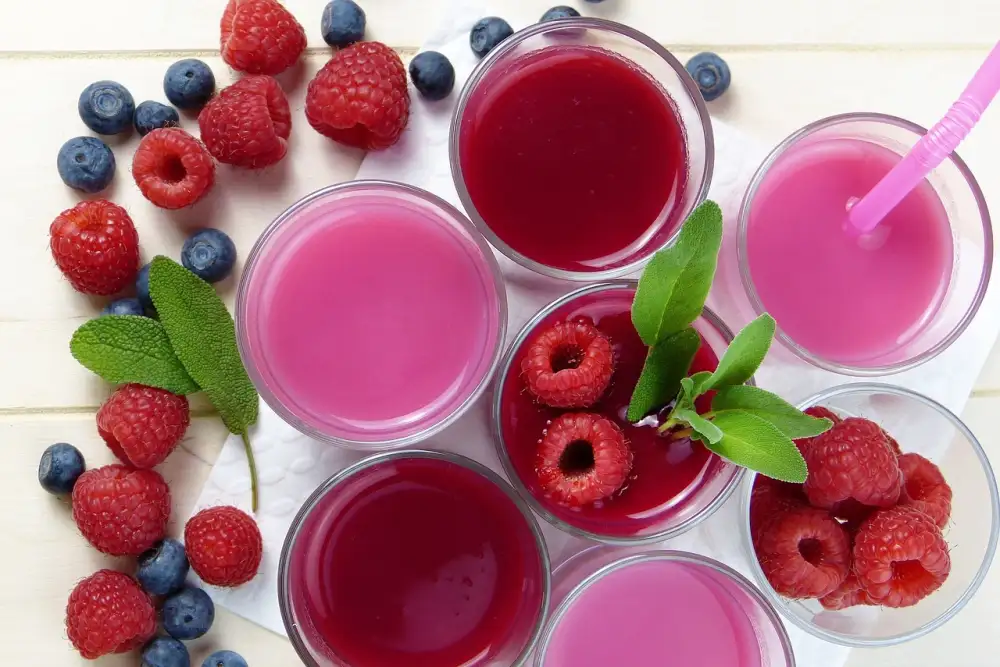Juice Diet: Unleashing the Power of Liquid Nutrition for Optimal Health

The juice diet, also known as juicing or juice fasting, has gained popularity in recent years as a way to cleanse the body and promote optimal health. This diet involves consuming only fresh fruit and vegetable juices for a certain period of time, while abstaining from solid foods. Proponents of the juice diet believe that it allows the body to detoxify and rejuvenate, leading to increased energy levels and improved overall well-being. In this article, we will explore the benefits of a juice diet, how to start one, choosing the right juices for your diet, incorporating solid foods into your juice diet, potential risks and precautions, as well as tips for a successful juice diet. So let's dive in and unlock the secrets of liquid nutrition for optimal health!
Benefits of a Juice Diet
A juice diet offers numerous benefits for your overall health and well-being. Here are some key advantages of incorporating juices into your daily diet:
1. Increased nutrient intake: Juices are packed with essential vitamins, minerals, and antioxidants that can boost your immune system and promote better overall health.
2. Improved digestion: Juices are easily digested by the body, allowing for better absorption of nutrients and aiding in digestion.
3. Weight loss: A juice diet can be an effective way to shed excess pounds as it is low in calories while still providing essential nutrients.
4. Detoxification: Juices can help cleanse your body by flushing out toxins and promoting the elimination of waste.
5. Enhanced hydration: Juices are an excellent source of hydration, helping to keep your body properly hydrated throughout the day.
6. Increased energy levels: The high concentration of nutrients in juices can provide a natural energy boost, leaving you feeling revitalized and refreshed.
7. Improved skin health: The vitamins and antioxidants found in juices can contribute to healthier skin by promoting collagen production and reducing inflammation.
8. Reduced inflammation: Certain fruits and vegetables used in juicing have anti-inflammatory properties that can help alleviate symptoms associated with chronic inflammation.
Incorporating a variety of fresh fruits and vegetables into your juice diet will maximize these benefits, ensuring you receive a wide range of nutrients essential for optimal health.
How to Start a Juice Diet
1. Set your goals: Determine why you want to start a juice diet. Whether it's for weight loss, detoxification, or simply improving your overall health, having clear goals will help you stay motivated.
2. Stock up on fresh produce: Purchase a variety of fruits and vegetables that you enjoy. Opt for organic options whenever possible to minimize exposure to pesticides.
3. Invest in a good juicer: Choose a juicer that suits your needs and budget. Centrifugal juicers are great for beginners, while masticating juicers extract more nutrients and enzymes.
4. Start with simple recipes: Begin by making basic juice combinations like carrot-apple or spinach-cucumber. As you become more comfortable, experiment with different flavors and ingredients.
5. Ease into the diet: Gradually replace one meal or snack with a juice each day. This allows your body to adjust to the change in diet without feeling overwhelmed.
6. Stay hydrated: In addition to drinking juices, make sure to drink plenty of water throughout the day to stay hydrated and support digestion.
7. Listen to your body: Pay attention to how you feel after consuming different juices. If certain ingredients don't agree with you or cause discomfort, adjust your recipes accordingly.
8. Keep track of your progress: Monitor how you feel physically and mentally as you continue with the juice diet. Take note of any changes in energy levels, digestion, or weight loss.
Remember, consulting with a healthcare professional before starting any new diet is always recommended.
Choosing the Right Juices for Your Diet
When embarking on a juice diet, it is important to choose the right juices that will provide you with the necessary nutrients and support your health goals. Here are some tips to help you make the best choices:
1. Opt for Freshly Squeezed: Freshly squeezed juices are always the best option as they retain more nutrients compared to store-bought varieties.
2. Include a Variety of Fruits and Vegetables: Aim to incorporate a wide range of fruits and vegetables in your juices to ensure you get a diverse array of vitamins, minerals, and antioxidants.
3. Consider Your Health Goals: Different fruits and vegetables offer specific health benefits. For example, if you want to boost your immune system, include citrus fruits like oranges and lemons. If you're looking for detoxification, consider adding leafy greens like kale or spinach.
4. Be Mindful of Sugar Content: While fruits contain natural sugars, it's important not to go overboard. Balance sweet fruits with low-sugar options like cucumber or celery.
5. Experiment with Combinations: Don't be afraid to mix different fruits and vegetables together to create unique flavors and maximize nutritional benefits.
Remember, juicing should complement a balanced diet rather than replace it entirely. Consult with a healthcare professional or nutritionist before starting any new diet plan to ensure it aligns with your individual needs and goals.
Incorporating Solid Foods into Your Juice Diet
While a juice diet primarily consists of consuming juices, it is important to incorporate solid foods for a balanced and sustainable approach. Solid foods provide essential nutrients, fiber, and help maintain satiety. Here are some tips on incorporating solid foods into your juice diet:
1. Start with small portions: Begin by introducing small amounts of solid foods alongside your juices. This can include raw fruits, vegetables, nuts, and seeds.
2. Focus on whole foods: Choose nutrient-dense whole foods that complement the vitamins and minerals in your juices. Opt for fresh produce, lean proteins, whole grains, and healthy fats.
3. Chew thoroughly: Chewing your food thoroughly aids digestion and allows your body to absorb nutrients more efficiently. Take your time to chew each bite before swallowing.
4. Plan your meals: Create a meal plan that includes a variety of solid foods to ensure you're getting a wide range of nutrients. Incorporate different colors and textures for a satisfying eating experience.
5. Listen to your body: Pay attention to how certain solid foods make you feel. Some people may find certain foods easier to digest than others during their juice diet journey.
Remember, the goal is to strike a balance between liquid nutrition and solid food consumption. Experiment with different combinations until you find what works best for you while still reaping the benefits of both worlds in terms of nourishment and satisfaction.
Potential Risks and Precautions of a Juice Diet
While a juice diet can offer numerous health benefits, it is important to be aware of potential risks and take necessary precautions. One major concern is the lack of essential nutrients such as protein, fiber, and healthy fats that are often found in whole foods. This can lead to deficiencies if the juice diet is followed for an extended period.
Another risk is the potential for blood sugar imbalances. Juices made from fruits can be high in natural sugars, which may cause spikes in blood sugar levels. This can be especially problematic for individuals with diabetes or insulin resistance.
It is also crucial to ensure that the juices used in the diet are safe and free from harmful bacteria or contaminants. It is recommended to use fresh, organic produce and properly clean all fruits and vegetables before juicing.
Furthermore, a juice diet may not be suitable for everyone, including pregnant women, individuals with certain medical conditions, or those on specific medications. It is advised to consult with a healthcare professional before starting any new diet regimen.
To minimize risks, it is advisable to incorporate variety into your juice diet by including a wide range of fruits and vegetables. Additionally, consider incorporating some solid foods into your diet to ensure you are getting enough essential nutrients.
By being aware of these potential risks and taking necessary precautions, you can safely enjoy the benefits of a juice diet while maintaining optimal health.
Tips for a Successful Juice Diet
1. Start with a variety of fruits and vegetables: Incorporating a wide range of produce will ensure you get a diverse array of nutrients.
2. Invest in a good juicer: A high-quality juicer will extract the maximum amount of juice, giving you the most nutrition possible.
3. Drink your juice immediately: Freshly made juice is more nutritious and flavorful, so try to consume it right away.
4. Stay hydrated: In addition to drinking juice, make sure to drink plenty of water throughout the day to stay properly hydrated.
5. Listen to your body: Pay attention to how your body responds to the juice diet. If you feel weak or lightheaded, consider incorporating more solid foods into your diet.
6. Gradually reintroduce solid foods: When transitioning off the juice diet, start by introducing easily digestible foods like soups and salads before moving on to heavier meals.
7. Seek professional guidance: If you have any underlying health conditions or concerns, consult with a healthcare professional or registered dietitian before starting a juice diet.
Remember, a juice diet can be a great way to boost your nutrient intake, but it's important to listen to your body and make adjustments as needed for optimal health and well-being.
Before embarking on a juice diet, it is important to consider if it is the right choice for you. While a juice diet can offer numerous health benefits and aid in weight loss, it may not be suitable for everyone.
If you have any underlying health conditions or are taking medication, it is crucial to consult with your healthcare provider before starting a juice diet. They can provide guidance and ensure that it will not interfere with your current treatment plan.
Additionally, if you have a history of disordered eating or struggle with maintaining a balanced relationship with food, a juice diet may not be the best option. It is essential to prioritize your overall well-being and mental health when considering any dietary changes.
Remember that a juice diet should not be viewed as a quick fix or long-term solution. It can be beneficial as part of a short-term detox or to kickstart healthier habits. However, incorporating whole foods into your diet is vital for obtaining all the necessary nutrients and maintaining optimal health in the long run.
Ultimately, the decision to try a juice diet should be based on your individual goals, preferences, and overall health. By considering these factors and seeking professional advice when needed, you can determine if a juice diet aligns with your lifestyle and supports your journey towards optimal health.
Published: 19. 12. 2023
Category: Food



